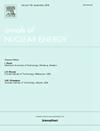热管理技术在核反应堆中的典型应用研究
IF 2.3
3区 工程技术
Q1 NUCLEAR SCIENCE & TECHNOLOGY
引用次数: 0
摘要
热管理技术是现代高精度电子器件发展中不可缺少的关键技术,其目的是将目标物体的温度控制在允许的范围内。核反应堆以其功率密度高、运行时间长等特点,是一种可持续的清洁能源,受到世界各国的青睐。在正常运行时,需要对堆芯和发热设备进行散热,保证堆芯安全稳定运行;在事故情况下,事故响应的核心未能从核心去除余热,以防止温度超过安全限制并造成更严重的后果。作为反应堆中最复杂的系统,研究高效的热管理系统是保证集散控制系统安全高效运行的必要条件。DCS系统需要开发高效的热管理系统,以确保其安全高效运行。DCS系统热管理的成败直接影响其性能、可靠性、环境舒适性和能源效率。在工业领域,热管理技术已经从传统的风冷发展到更高效的冷却方法,如液体冷却和相变冷却,显著提高了热管理效率,同时使热管理系统的小型化和紧凑化成为可能。目前DCS系统普遍采用风冷散热方式,导致系统体积大、运行噪声高、控温性能差。随着核电对DCS系统小型化、模块化、数字化、智能化的要求不断提高,加上芯片性能的显著提高导致热流密度的大幅增加,效率较低的风冷方式已经不能满足DCS系统更高的散热要求。本文对热管理技术在DCS热控制设计中的应用进行了研究。建立了模块化DCS板模块模型,对风冷和液回路冷却两种方式进行了建模、计算、分析和比较。并进行了灵敏度分析,为下一步设计高效的DCS系统热管理系统提供参考。本文章由计算机程序翻译,如有差异,请以英文原文为准。
Typical application studies of thermal management technology in nuclear reactor
Thermal management technology is an indispensable key technology in the development of modern high-precision electronic devices, aiming to control the temperature of target objects within an allowable range. In nuclear reactors, characterized by high power density and long operating duration, represent a sustainable and clean energy source, favored by countries around the world. During normal operation, it is necessary to remove heat from the reactor core and heat-generating equipment to ensure the core operates safely and stably; in accident scenarios, the core of accident response failure in removing residual heat from the core to prevent temperatures from exceeding safety limits and causing more severe consequences. As the most complex system in a reactor, researching efficient thermal management systems is a necessary condition for ensuring the safety and efficient operation of DCS(Distributed control system) systems. DCS systems require the development of efficient thermal management systems to ensure their safe and efficient operation. The success or failure of thermal management in DCS systems directly impacts their performance, reliability, environmental comfort, and energy efficiency. In the industrial sector, thermal management technology has evolved from traditional air-cooling to more efficient cooling methods such as liquid cooling and phase-change cooling, significantly improving thermal management efficiency while enabling miniaturization and compactness of thermal management systems. Currently, DCS systems typically employ air-cooling for heat dissipation, resulting in large system sizes, high operational noise, and poor temperature control performance. With the increasing demands on DCS systems for miniaturization, modularization, digitization, and intelligence in nuclear power, coupled with the significant improvement in chip performance leading to a substantial increase in heat flux density, the air-cooling method with its low efficiency has become inadequate to meet the higher heat dissipation requirements of DCS systems. This paper conducts research on the application of thermal management technology in DCS thermal control design. A modular DCS board module model is established, and both air-cooling and liquid loop cooling methods are modeled, calculated, analyzed, and compared. Sensitivity analyses are also performed to provide references for the next step in designing efficient thermal management systems for DCS systems.
求助全文
通过发布文献求助,成功后即可免费获取论文全文。
去求助
来源期刊

Annals of Nuclear Energy
工程技术-核科学技术
CiteScore
4.30
自引率
21.10%
发文量
632
审稿时长
7.3 months
期刊介绍:
Annals of Nuclear Energy provides an international medium for the communication of original research, ideas and developments in all areas of the field of nuclear energy science and technology. Its scope embraces nuclear fuel reserves, fuel cycles and cost, materials, processing, system and component technology (fission only), design and optimization, direct conversion of nuclear energy sources, environmental control, reactor physics, heat transfer and fluid dynamics, structural analysis, fuel management, future developments, nuclear fuel and safety, nuclear aerosol, neutron physics, computer technology (both software and hardware), risk assessment, radioactive waste disposal and reactor thermal hydraulics. Papers submitted to Annals need to demonstrate a clear link to nuclear power generation/nuclear engineering. Papers which deal with pure nuclear physics, pure health physics, imaging, or attenuation and shielding properties of concretes and various geological materials are not within the scope of the journal. Also, papers that deal with policy or economics are not within the scope of the journal.
 求助内容:
求助内容: 应助结果提醒方式:
应助结果提醒方式:


